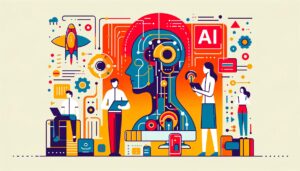When you apply to college, your college application essays are your chance to show who you are beyond grades and...
Read More
Published: March 22, 2024 | Updated: September 26, 2024
In today’s digital age, AI tools stand at the forefront of transforming how students approach academic writing. These sophisticated technologies offer unparalleled support, enabling learners to refine their writing skills and foster a deeper understanding of their subjects. AI writing assistants can prove invaluable for students eager to navigate the complexities of their academic journey with innovation. They enhance the writing process through advanced grammar corrections and stylistic suggestions and inspire creativity and critical thinking by providing fresh perspectives on topics. This evolution in academic tools encourages a responsible approach to technology, emphasizing the importance of maintaining academic integrity while leveraging AI for educational advancement.
As we delve into AI’s capabilities and ethical considerations in academic writing, let this article serve as your guide to harnessing these tools effectively. Read on to discover how you can elevate your writing, think more critically, and achieve academic success with AI by your side.

Generated content is a product of artificial intelligence technologies, which utilize complex algorithms and machine learning to create text, data, or media across diverse subjects and genres. For students, the transition from an initial concept to a polished draft can be significantly smoothed with writing assistants. These tools excel in generating innovative ideas and refining drafts, thus enhancing academic work. By understanding both the potential and the boundaries of these technologies, learners can incorporate AI assistance into their studies in a way that aligns with their educational goals and upholds ethical standards. An integral part of this process involves using sophisticated AI writing essay tools like the undetectable essay writer, designed to make the integration of AI in academic writing seamless and the resulting essay undetectable by standard detection methods.
As educational institutions strive to uphold academic integrity, they employ specialized software to identify content generated, focusing on syntactical structures and patterns that typically signify AI involvement. This advancement places a premium on the ability of students to produce work that truly reflects their insights and intellect, a fundamental aspect of academic success. Awareness of these detection technologies is crucial for students who seek to use tools, ensuring their work is perceived as authentically theirs, thus, any AI contribution to their essay is undetectable by these advanced tools.
To navigate the challenges of using AI in academic writing, students can leverage tools designed to mimic the detection processes of educational institutions. These simulations identify potential markers of AI authorship, such as repetitive patterns or distinct phrasing, providing invaluable insights for revision. Familiarity with these markers enables students to refine their drafts, ensuring they embody the student’s voice and deep understanding. This critical engagement with generated drafts, particularly when revised to ensure the assistance is essay undetectable, fortifies the academic integrity of the submission, aligning with the rigorous standards expected in scholarly work.
Creating content that integrates seamlessly into an academic context requires a strategic approach. Initially, AI catalyzes brainstorming and drafting, laying down a foundational layer of content. The critical phase follows, where students immerse themselves in the material, enriching it with their analytical insights and personal flair. This process transforms the draft into a refined piece of work that benefits from AI assistance and carries the unmistakable imprint of the student’s intellectual endeavor. Engaging deeply with the content to ensure it becomes essay undetectable in its AI origins is key to leveraging tools effectively. This approach not only conceals the role in the essay’s creation but also enhances the student’s learning experience, ensuring the work truly reflects their capabilities and insights.
The advent of artificial intelligence in education has provided students with powerful tools to enhance their writing, offering unparalleled support in crafting essays that stand out for their clarity, coherence, and depth. However, the ultimate goal is to use these tools in a way that the resulting work is indistinguishable from essays written entirely by the student, ensuring that the voice and understanding of the learner are at the forefront.
Adopting tools for academic writing requires a careful, ethical approach to ensure the produced essay is undetectable as AI-generated, reflecting the student’s unique perspective and analytical skills:
The interaction with AI-generated content offers a unique opportunity to enhance creativity and critical thinking in academic writing. By challenging and expanding upon the ideas suggested by AI, students can explore new avenues of thought, deepen their analysis, and develop more nuanced arguments, ultimately leading to richer, more compelling essays.
As we navigate the evolving landscape of educational technology, the ethical integration of AI tools in academic writing represents a significant opportunity for students. By leveraging these tools judiciously, students can enhance their writing process, making the essay undetectable as AI-assisted while enriching their learning experience. This approach ensures compliance with academic standards and fosters a deeper engagement with the material, promoting critical thinking and personal growth. Embrace AI with integrity, and let it serve as a bridge to achieving academic excellence and a more profound understanding and appreciation of your subjects.
When you apply to college, your college application essays are your chance to show who you are beyond grades and...
Read More
A compare and contrast essay shows the similarities and differences between two or more subjects. It is common in middle...
Read More
The purpose of this article is to explain plagiarism encountered in journalism by explaining the phenomenon with examples and reasoning....
Read More